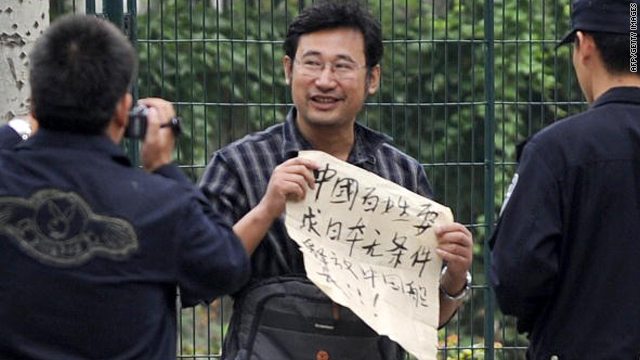Japan rejects apology on China boat row
September 25, 2010 -- Updated 1534 GMT (2334 HKT)

A protestor shows his banner declaring "Chinese people demand Japan to release unconditionally the Chinese captain" as police film him in front of the Japanese embassy in Beijing on September 20, 2010.
The statement Saturday went on to assert Japanese jurisdiction over the islands where the captain was detained and declared that the dispute was handled in accordance with Japanese law.
Zhan Qixiong was detained earlier this month after his trawler collided with Japanese vessels near disputed islands in the East China Sea. He was freed on Friday.
Earlier, Satoru Sato, a spokesman for the Japanese Foreign Ministry, made similar statements to Japan's Kyodo news agency in response to China's apology demand.
Despite this call for an apology, China's Foreign Ministry said in a statement that the two sides should resolve the problems through dialogue and consultation, according to Chinese state media.
Zhan was accused of obstructing Japanese public officers while they performed their duties, China's Xinhua news agency said.
He arrived home safely on Saturday, according to Xinhua.
"We decided to suspend the charges in consideration of the Japan-China relationship," the Japanese prosecutor in the case said.
The arrest tensions between the two countries, with Beijing accusing Japan of "unlawful and invalid" arrest of the captain and his crew of 14, according to Xinhua.
China considers the Diaoyu Islands and most of the South China its property, disputing neighboring countries' claims.
In Japan, the islands are known as the Senkaku. The clash over territorial waters and islands -- and the natural resources
that go with them -- is a flash point in the Asia-Pacific region.
Word of the captain's release quickly followed the arrest of four Japanese nationals in China.
The four are being investigated for entering a military zone without authorization and videotaping military targets, Chinese state media said.
Neither country linked the captain's case with the arrest of the four Japanese nationals.
No comments:
Post a Comment